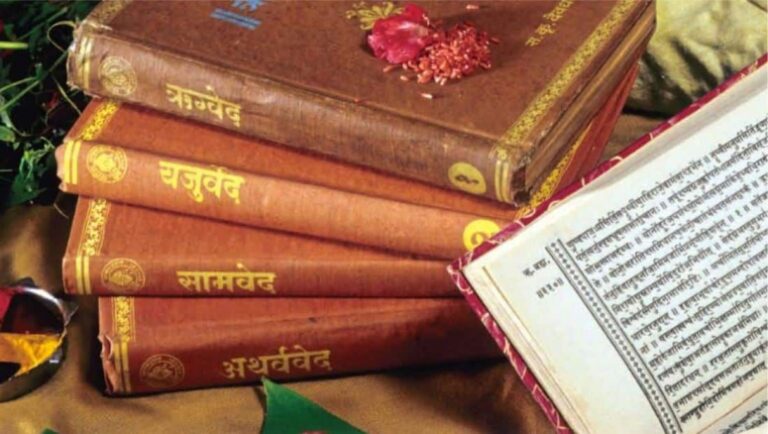![]()
The Vedas, often described as the “light of India” and celebrated as the “light of the world” by some scholars, occupy a hallowed place in human history. These ancient scriptures are not only revered as the earliest written records but also regarded as the bedrock of wisdom and literary excellence. Rooted in the spiritual and religious traditions of India, the Vedas constitute an integral facet of the Hindu identity and have made indelible contributions to global wisdom. In this comprehensive exploration, we will delve into the profound significance of the Vedas, their origin, content, and their enduring relevance in our modern world.
Origin of the Vedas
The origins of the Vedas have been a subject of debate among scholars and theologians. Traditionalists attribute the creation of the Vedas to Lord Brahma, believing them to be divine revelations. In contrast, historians and rationalists suggest that the Vedas emerged from the enlightened minds of ancient sages and seers during the Vedic age. These texts are believed to have been first revealed to four super-sages – Agni, Vayu, Aditya, and Angira – before being passed on to Lord Brahma. Additionally, the revered sage Vedavyasa is often credited with compiling and scripting the Vedas.
The Four Vedas
Originally, a single Veda existed, which was subsequently divided into four distinct parts. These four Vedas are:
- Rig Veda: The most ancient of the Vedas, it contains knowledge and wisdom spanning various aspects of reality, including invocations, rituals, and even medical science. Rig Veda comprises 10 chapters, 1,028 suktas, and approximately 11,000 mantras.
- Yajur Veda: Primarily focusing on Karma kand (religious rituals and procedures) and the methods and procedures of Yajnas (sacrificial offerings), Yajur Veda consists of 1,975 mantras. It is divided into two parts: Krishna and Shukla, each with its own branches and chapters. This Veda also contains knowledge of the impersonal God.
- Sam Veda: Often referred to as the Veda of devotion and mantras, it is composed in poetic form and forms the foundation of Music Science. Many of its mantras are derived from the Rig Veda. Sam Veda features 1,549 shloka mantras, though other sources cite 1,824 mantras.
- Atharva Veda: Known as the Veda of both war and peace, Atharva Veda encompasses diverse subjects, including Ayurveda (traditional Indian medicine) and mantras for treating diseases. Comprising 5,687 mantras spread across 20 chapters, Atharva Veda is divided into eight parts and is considered the last Veda to be composed.
Historical Significance
The Vedas hold the distinction of being the oldest written documents in human history, with some manuscripts dating back thousands of years. The Bhandarkar Oriental Research Institute in Pune houses approximately 28,000 Vedic manuscripts, while UNESCO has recognized 30 Rig Veda manuscripts as part of the world’s cultural heritage. These ancient texts bear testament to India’s rich cultural and spiritual heritage and have played a pivotal role in shaping Indian civilization.
Key Teachings and Subjects in the Vedas
The Vedas serve as a treasure trove of knowledge and wisdom, encompassing a vast array of subjects. They delve into topics such as the nature of God, the universe, astrology, mathematics, medical science, nature, geography, religious rules, traditions, and much more. Additionally, the Vedas provide guidance on distinguishing between right and wrong and offer profound insights into the cosmos and the nature of reality.
The Vedas’ Contribution to the World
The Vedas have made profound contributions to humanity’s knowledge base. They have provided invaluable insights into mathematics, philosophy, technology, astronomy, medical science, surgical procedures, logic, language, culture, and fine arts. Notably, the Charaka Samhita, a seminal work on Ayurveda, finds its roots in the teachings of the Vedas. Sanskrit, the language of the Vedas, is recognized as the oldest language and is venerated as a divine tongue. Moreover, Yoga, a profound gift from the Vedas, has gained immense popularity and widespread adoption globally.
The Vedas, as the cornerstone of India’s spiritual wisdom, continue to represent an invaluable source of profound knowledge and guidance. Their significance extends far beyond India’s borders, leaving an indelible mark on various fields of human endeavor and enriching global understanding. In our exploration of the Vedas, we embark on a journey into an ancient repository of wisdom, one that continues to illuminate the path to enlightenment, knowledge, and a deeper understanding of the universe and our place within it.
Reference:







